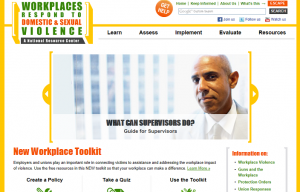Domestic violence can jeopardize a survivor’s ability to keep a job, typically either because of the need for time off to attend court or to receive medical care, or due to the abuser’s interference in the survivor’s ability to conduct her daily life by preventing her from going to work, harassing her at work, limiting access to money and transportation, or manipulating child-care arrangements. Survivors are therefore more likely than other women to be unemployed, to suffer from health problems that can affect employability and job performance, to report lower personal income, and to rely on public benefits (Legal Momentum, 2015). Resources listed below focus on statistics, studies, laws and information on employer responses to domestic violence in the workplace.
 Workplaces Respond to Domestic and Sexual Violence: A National Resource Center
Workplaces Respond to Domestic and Sexual Violence: A National Resource Center
The “Workplaces Respond” Resource Center offers information for the benefit of those interested in providing effective workplace responses to victims of domestic violence, sexual violence, dating violence, and stalking. Through innovative partnerships between companies, worker associations and unions, and anti-violence advocates and service providers, Workplaces Respond helps increase the safety and economic security of vulnerable survivors.
 The Corporate Alliance to End Partner Violence (CAEPV) is a national nonprofit organization dedicated to reducing the costs and consequences of partner violence at work - and eliminating it altogether. From policies and programs to legal issues and legislation, CAEPV is a credible source for information, materials and advice.
The Corporate Alliance to End Partner Violence (CAEPV) is a national nonprofit organization dedicated to reducing the costs and consequences of partner violence at work - and eliminating it altogether. From policies and programs to legal issues and legislation, CAEPV is a credible source for information, materials and advice.









